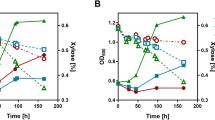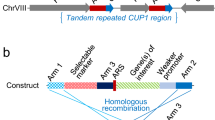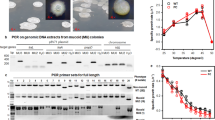Abstract
THE receptor1,2 of the melezitose (MZ) gene-system comprises at least five ‘elements’ corresponding to five α-glucosidic inductors of the enzyme melezitase, an α-glucosidase capable of splitting the five different α-glucosidic inductors of MZ, namely, turanose, maltose, sucrose, α-methyl-glucoside and melezitose3,4. The totipotent allele, which responds adaptively to all five substrates, is designated MZTMSGZ (abbreviated to TMSGZ). Partially recessive alleles, for example, TMSGz, TMSgz, TMsgz, Tmsgz, and the totally recessive allele, tmsgz, were obtained by ultra-violet irradiation5. (The small letters indicate specific inabilities of cultures to respond adaptively to the corresponding substrates.) The multiple alleles are inferred, on the receptor-hypothesis1,2, to reflect mutations (heritable changes in folding) of the proteinaceous receptor, a component of the gene controlling the capacity to respond to different inductors. It is of special interest to know if the synthetic α-glucoside, palatinose (α-glucosido-6-fructofuranose), can act as a substrate and an inductor of this particular enzyme. Emeis6 has already shown that Saccharomyces cultures carry genes controlling the fermentation of palatinose, but since there are other genes which split α-glucosides (and fructofuranosides), and since he did not have genetically identified MZ cultures with which to make specific tests, further analysis was necessary to implicate MZ. The totipotent TMSGZ cultures of the Lindegren Breeding Stock are able to ferment palatinose after 48 h, but specific partial mutants, for example, TMsgz and recessive tmsgz cultures, do not ferment palatinose when tested on EMB-agar and by the Durham tube technique (remained negative for five days)7. The fact that the TMSGZ cultures fermented palatinose suggested that palatinose might be one of the substrates (and possibly an inductor) by which the different alleles of the MZ locus may be distinguished from each other.
This is a preview of subscription content, access via your institution
Access options
Subscribe to this journal
Receive 51 print issues and online access
$199.00 per year
only $3.90 per issue
Buy this article
- Purchase on Springer Link
- Instant access to full article PDF
Prices may be subject to local taxes which are calculated during checkout
Similar content being viewed by others
References
Lindegren, C. C., J. Theor. Biol., 5, 192 (1963).
Lindegren, C. C., Nature, 199, 720 (1963).
Palleroni, N. J., and Lindegren, C. C., J. Bact., 65, 122 (1953).
Lindegren, C. C., and Lindegren, G., Genetica, 26, 430 (1953).
Lindegren, C. C., Pittman, D. D., and Ranganathan, B., Proc. Intern. Genetics Symp., Japan (1956) Cytologia Supp., 42 (1957).
Emeis, C. C., Z. Naturforschung, 17b, 633 (1962).
Lindegren, C. C., Wallerstein Lab. Commun., 19, 49 (1956).
Baird, V., Hestrin, S., and Lindegren, C. C., Wallerstein Lab. Commun., 15, 213 (1952).
Hestrin, S., and Lindegren, C. C., Nature, 165, 158 (1950).
Author information
Authors and Affiliations
Rights and permissions
About this article
Cite this article
HWANG, D., LINDEGREN, C. Palatinose Element of the Receptor of the Melezitose Locus in Saccharomyces. Nature 203, 791–792 (1964). https://doi.org/10.1038/203791a0
Published:
Issue Date:
DOI: https://doi.org/10.1038/203791a0
This article is cited by
Comments
By submitting a comment you agree to abide by our Terms and Community Guidelines. If you find something abusive or that does not comply with our terms or guidelines please flag it as inappropriate.



